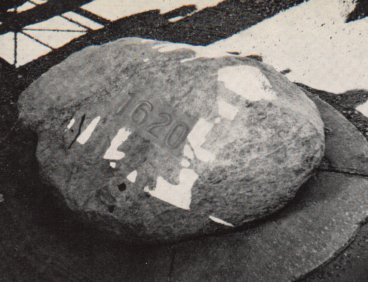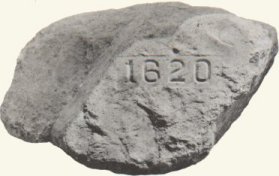 their dealings was to spread, making trading furs easier.
They did not cheat, rob, or corrupt the Indians. They dealt justly and paid
adequately for what they took. And Squato proved to be both a good interpreter and
an able negotiator."
their dealings was to spread, making trading furs easier.
They did not cheat, rob, or corrupt the Indians. They dealt justly and paid
adequately for what they took. And Squato proved to be both a good interpreter and
an able negotiator." Myth - Pilgrims were harsh, rigid, intolerant and bigoted
The Pilgrims were also more tolerant than the Puritans. When Roger Williams was kicked out of the Puritan colony he was welcomed to stay at Plymouth even though he believed differently than them. Miles Standish was a Catholic who never converted and they respected that and still made him their military commander.
In the book Stepping Stones, the authors write, "Were the Pilgrims a bigoted and intolerant band? In all fairness, they must be measured against the harshness of the society from which they came, not against the permissiveness of three and a half centuries later."
Did they deny the rights of others? "There is good evidence that they were willing to accord liberty of thought and conscience to others -- a most remarkable virtue for their day. Goodwin in his Pilgrim Republic had this to say: 'The Pilgrims were not repressive ... The Pilgrim Fathers heartily welcomed to their little state all men of other sects, who adhered to the essentials of Christianity and were ready to conform to the local laws and customs.'"
"They were in advance of their brethren in England; much in advance of ... their sister colony of Massachusetts ... they were more tolerant. At the Lord's table they communed with pious Episcopalians, with Calvinists of the French and Dutch churches and with Presbyterians, and recognized the spiritual fraternity of all who held the (Christian) faith."
"Myles Standish came from a well-placed Roman Catholic family, a member of which had been a bishop... it appears that Standish never joined the Plymouth church. Even more significantly, although he attended services and adhered to the principles of the church, he declined to accept communion."
"It is known that Standish counseled toleration in religious matters. It is also evident from his high place on the General Court that the colony accepted his religious divergence but shared his toleration."
"For themselves, the Pilgrims held to a strong faith but little formal creed."
"At this time Massachusetts Bay Colony restricted the franchise to members of the church. It also made attendance on public worship compulsory. Church attendance at Plymouth was voluntary. Right to vote did not depend on church membership."
Plymouth accepted some who had been expelled from the Puritan colony. Once the Pilgrims had their spirit of tolerance tested when a group of Quaker evangelists disrupted their community. One book says, "But despite their hatred of the Quakers, the Pilgrims did not go the extremes practiced by the Puritans in their war on the Friends. Quakers caught by Puritans had their ears sliced off, their cheeks branded with hot irons, or were beaten insensible, flayed with tarred ropes, stripped of all possessions -- even blinded and hanged."
"Plymouth took a gentler course. Henry Fell, a Quaker, wrote in 1657: 'In Plymouth there is a people not so rigid as the others in Boston, and there are great desires among them after the truth.' The Pilgrims did use public whippings and confinement in stocks sometimes, but these "were used with restraint. Repentance frequently brought forgiveness."
In the book The Mayflower Compact we read that the Puritan colonies became theocracies ruled by harsh clergymen: "The Pilgrim colony was never a theocracy... there was a great deal more individual freedom in Plymouth than in the Puritan colonies. One who tattled on a neighbor, for instance, could be punished for slander. There were never any convictions for witchcraft in Plymouth as there were in nearby Salem."
Pilgrims respected the Indians
The Pilgrim's treaty with Massasoit lasted until his death forty years later and after that with his sons. We read in Stepping Stones, "The treaty also provided for return of the stolen tools by the Indians and the payment to the Pamet Indians by the settlers for the corn that had been appropriated by the Pilgrim explorers when they first landed. Nothing like this had ever happened before to the Indians, and they were greatly impressed with the policy of firmness and fairness with which these men operated."
"The story of  their dealings was to spread, making trading furs easier.
They did not cheat, rob, or corrupt the Indians. They dealt justly and paid
adequately for what they took. And Squato proved to be both a good interpreter and
an able negotiator."
their dealings was to spread, making trading furs easier.
They did not cheat, rob, or corrupt the Indians. They dealt justly and paid
adequately for what they took. And Squato proved to be both a good interpreter and
an able negotiator."
"The colonists, and especially the Governor [Bradford], were held in much esteem. ... The Pilgrims treated the Indian with dignity and with friendship, respecting his personal as well as property rights and receiving him into their community for special occasions."
"The most famous of these, of course, was the first Thanksgiving, when they shared their bounty. And the Indians responded by killing five deer and presenting them to the Governor, Captain Standish, and others."
"Their dealings with other tribes were equally
correct. When toughness was needed, the Pilgrim fathers could be  both brave and stern. When the
Narragansetts decided to test them with a hostile threat by sending a great snakeskin
wrapped around a bundle of arrows, they sent it back with a protestation of friendship on
the one hand and a stuffing of powder and bullets on the other. The Narragansett
chief would not touch it but returned it. Nothing more was heard of the
affair."
both brave and stern. When the
Narragansetts decided to test them with a hostile threat by sending a great snakeskin
wrapped around a bundle of arrows, they sent it back with a protestation of friendship on
the one hand and a stuffing of powder and bullets on the other. The Narragansett
chief would not touch it but returned it. Nothing more was heard of the
affair."
"Edward Winslow in his Good News from New England wrote: 'The Providence of God ... possessed the hearts of the savages with astonishment and fear of us. Wheras if God had let them loose, they might easily have swallowed us up; scarcely being a handful by comparison to those forces they might have gathered together against us ... Blessed therefore be His name! That hath done so great a thing for us.' If any one of the 'miracles' had failed the Pilgrims, the Plymouth Plantation might have been still-born."
Rebirth
Rev. Jhoon hyn Pak, a Korean leader in the Unification Church, in a Sunday sermon once spoke of the Pilgrims and the significance of their ship being named Mayflower. May is a symbol of rebirth and renewal. It is a revolutionary month. The Unification Church was founded on May 1. The Mayflower was God's quiet revolution of love and faith. A flower is a symbol of God.
Puritans
After the Pilgrims came the Great Migration of the Puritans. The North and South were split over religion. The Church of England was dominant in the South, but the Northern colonies were settled by Puritans. In 1630 John Winthrop established Boston, 40 miles north of Plymouth. They came well-financed and well-equipped and brought in 1630 alone more than 1,000 settlers.
The Puritans strove to build "a form of civil government instituted by God himself in the Holy Scriptures ... to make the Lord God our Governor." They founded Harvard, America's first college. Students were to consider the main end of their lives and studies to be the knowledge of God and Jesus Christ. They prayed everyday. The Bible was read twice a day. The foundation of America’s first college was religious. Today, it isn't.
Revisionist historians
Historians have shattered the myth that the Puritans were anti-intellectual and led a joyless life of obedience to a harsh and distant God. Freudianism was popular in the 1920's and the Puritans were blamed for any repressive, neurotic tendencies of American life. Intellectuals complained that America was super moralistic and anti-intellectual because of the Puritans. H.L. Menchen summed up the image by defining a Puritan as one who had "the haunting fear that someone, somewhere, may be happy."
Historians such as James Truslow Adams and Vernon Parrington were hostile to the Puritans and Pilgrims. Revisionist historians have written against this prejudice and rebutted Menchen and his like. The two main historians who revised the incorrect views were Perry Miller and Samuel Eliot Morrison of Harvard.
Pilgrims honored in 1820
In 1820 at the bicentennial of the rounding  of Plymouth, Daniel Webster said that there is a deeply religious
foundation for our national blessings, "Finally, let us not forget the religious
character of our origin. Our fathers were brought hither by their high veneration for the
Christian religion. They journeyed by its light, and labored in its hope. They sought to
incorporate its principles with the elements of their society, and to diffuse its
influence through all their institutions, civil, political, or literary. Let us cherish
of Plymouth, Daniel Webster said that there is a deeply religious
foundation for our national blessings, "Finally, let us not forget the religious
character of our origin. Our fathers were brought hither by their high veneration for the
Christian religion. They journeyed by its light, and labored in its hope. They sought to
incorporate its principles with the elements of their society, and to diffuse its
influence through all their institutions, civil, political, or literary. Let us cherish  these sentiments, and extend
this influence still more widely in the full conviction, that that is the happiest society
which partakes in the highest degree of the mild and peaceful spirit of
Christianity."
these sentiments, and extend
this influence still more widely in the full conviction, that that is the happiest society
which partakes in the highest degree of the mild and peaceful spirit of
Christianity."
1920
In 1920 America celebrated the 300th birthday of the spiritual birth of America with the landing in 1620 of the Pilgrim Fathers who came to build a nation that would be a free and beautiful home for God and their descendants to live in.
New Pilgrim movement
Reverend Moon was born in 1920, and forty years later he sent three missionaries to America. Miss Kim, David Kim and Dr. Pak left their country to come to America. Twelve years later in 1972 Rev. Moon came to America and spoke throughout proclaiming in his Day of Hope tour: "I have initiated a youth movement which is probably the only one of its kind in United States history. This is a new Pilgrim movement."
Reverend Moon
The Messiah said in every state publicly to the Christians of America that there are tens of millions of Christians, and the Unification Church may be only a few thousand but "... the mere numbers of the Christian population in America are not impressive. You cannot impress God with numbers, but only with fervent faith. The standard is the quality of Abraham's faith. How many Christians in America are really crying out with fervor for God ... How many people put God first? How many are ready to die for God?"
He said, "I made a covenant with our young people of America that we will strive in partnership with God for this great crusade. I want you to join. I want you to support these young people. There is nowhere else to turn. When you bring God back into your home, your home is secure. Your juvenile delinquency problem will be solved. There is no good answer to the racial problem except God. Communism will be no threat when God is made real. God will increase your wealth. This is the one way that America can save herself."
"This is my deep desire, from my heart, that America will see the glorious day of renewal. And for this reason I came to speak to you with hope for America."
Reverend Moon said the Pilgrims "had to give up their families, their relatives, their surroundings, and their country, and head toward an unknown land. Their only hope was in God. Every step they took they depended upon God. Their journey was long, and there were many storms. They prayed unceasingly to God. They had but one way to turn. They turned to God. Those Pilgrim men and women were one with God. And that is how they survived."
"Put yourself in their position of total reliance on God. What a wonderful faith! I am sure that the faith of the Pilgrim Fathers touched the heart of God. Nothing could have given them this kind of courage, this kind of dedication, this kind of sacrificial spirit except their faith in God."
The relationship between church and state is that church is in the subject position or leader, and government is in the objective or follower position. Government is to be guided by religious values. The Puritans put God first in their politics. The Mayflower Compact begins "In the Name of God, Amen" in large letters.
Plymouth Rock
Plymouth Rock is the only boulder on the sandy shore. The people of Plymouth placed
such  value on the Rock
that when the townspeople in the next century built their first wharf they built it right
over the Rock. The Plymouth Rock is a symbol of great faith and hope.
value on the Rock
that when the townspeople in the next century built their first wharf they built it right
over the Rock. The Plymouth Rock is a symbol of great faith and hope.
The most famous symbol of the Puritans is Plymouth Rock which is today housed in a granite museum. This rock is symbolic for not only their rock-like faith but providentially it is a symbol for Christ who had come to America. Reverend Moon was born in 1920 on the 300th anniversary of the birth of America. This is not a coincidence. The number three is the number of God and perfection and a number of separation. America was now ready to receive the Messiah. Forty years after the Messiah's birth in 1960, three missionaries were in America beginning the building of the "new Pilgrim movement." Reverend Moon said in his Day of Hope tours that the "Unification Church is the new Pilgrim movement." He said that his "followers in Korea bade me farewell in tears ... I gave up my surroundings ... just as many people have in the history of God's providence."
He said that the young members of the Unification Church "are capable of earning tens of thousands of dollars a year, but instead they are going out on the streets asking you to come to these lectures. Their hearts are compassionate. They have one purpose. They want to save America. They want to bring God back to America.…"
Rev. Moon says America was "begun in the sacrificial spirit pursuing God’s purpose and that is why America is today free and wealthy."
The Messiah landed in America on the east coast in December 1971. He and his wife arrived without his children who stayed back in Korea. My wife stayed with Rev. and Mrs. Moon for one week in 1973. She saw Mrs. Moon crying on the phone as she talked to her small children who were in Korea.
America has lost its spirit. We need to revive the spirit of purity, hard work, high moral standards, prayer, courage, humility, sacrifice, and alertness to God directions and to Satan's constant attacks.
We should love God even more than the Pilgrims. The Pilgrims had a national vision; Unificationists have a world wide vision. Reverend Moon and his followers are working to build an ideal world. If you are not a follower of Sun Myung Moon I encourage you to study his teaching and then join his new Pilgrim movement that someday will grow from being a little mustard seed to the greatest movement in history. God is calling you. Can you hear?
![]()